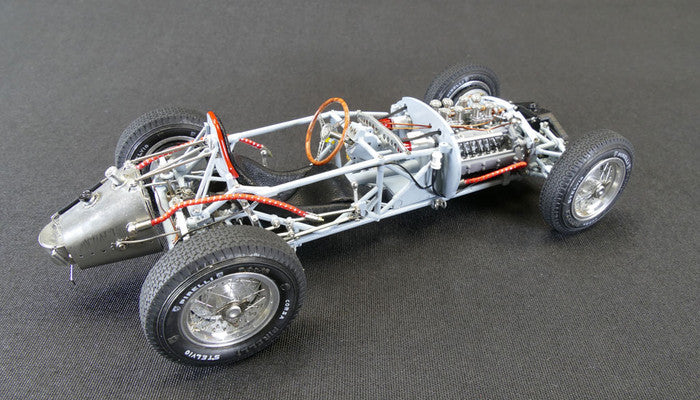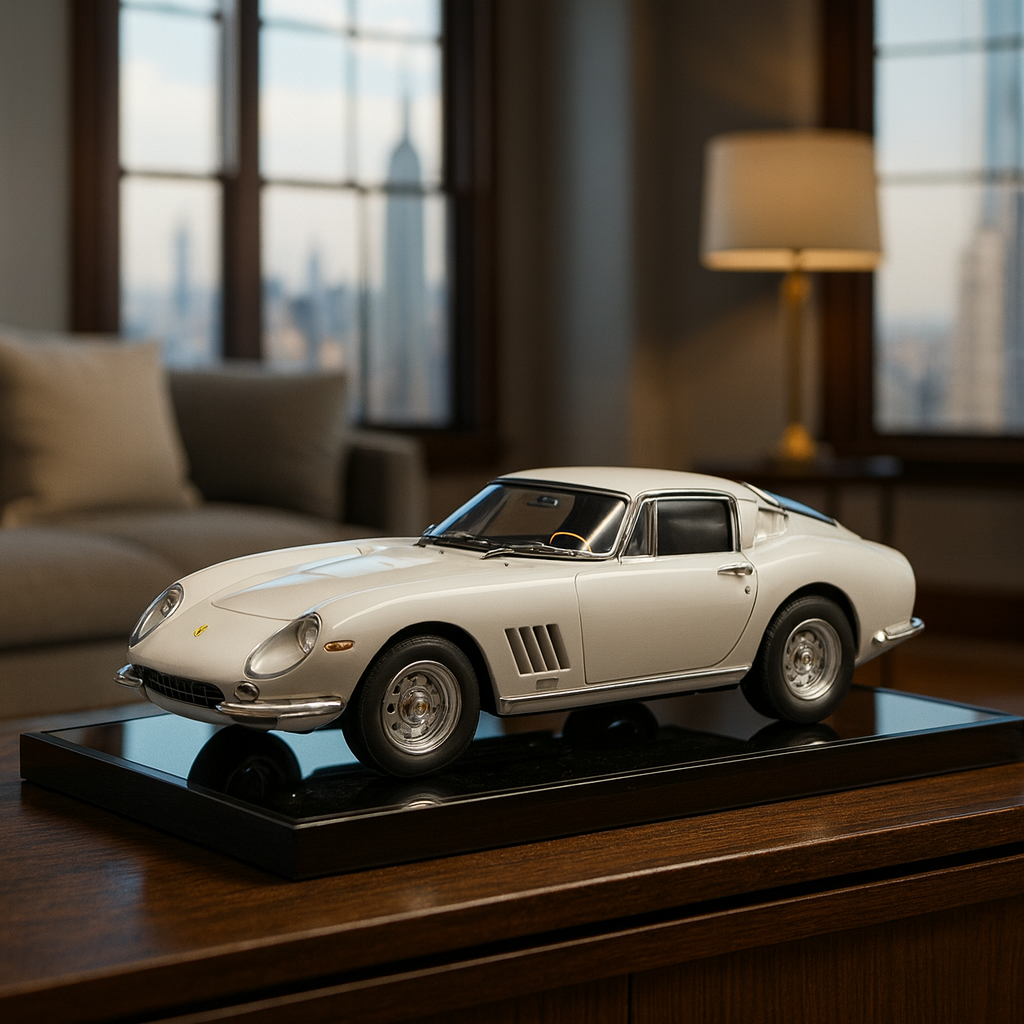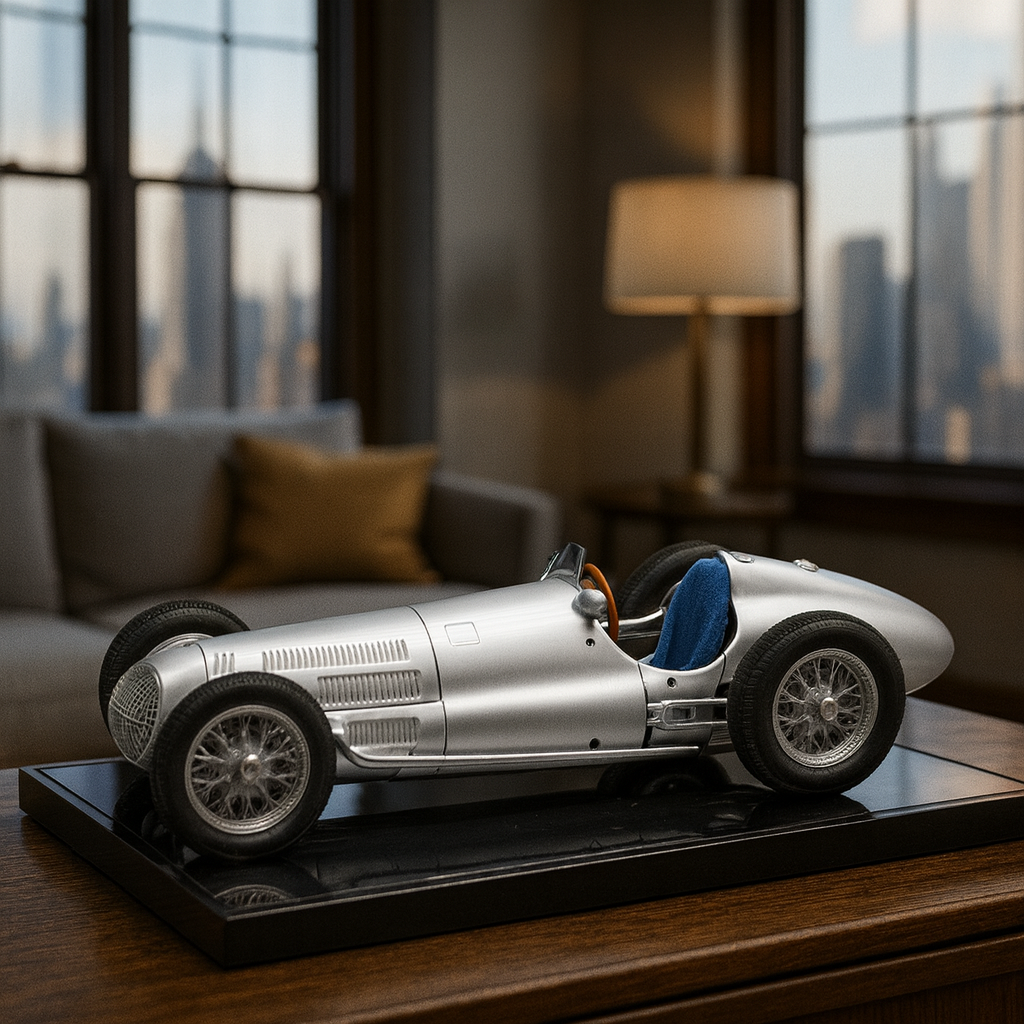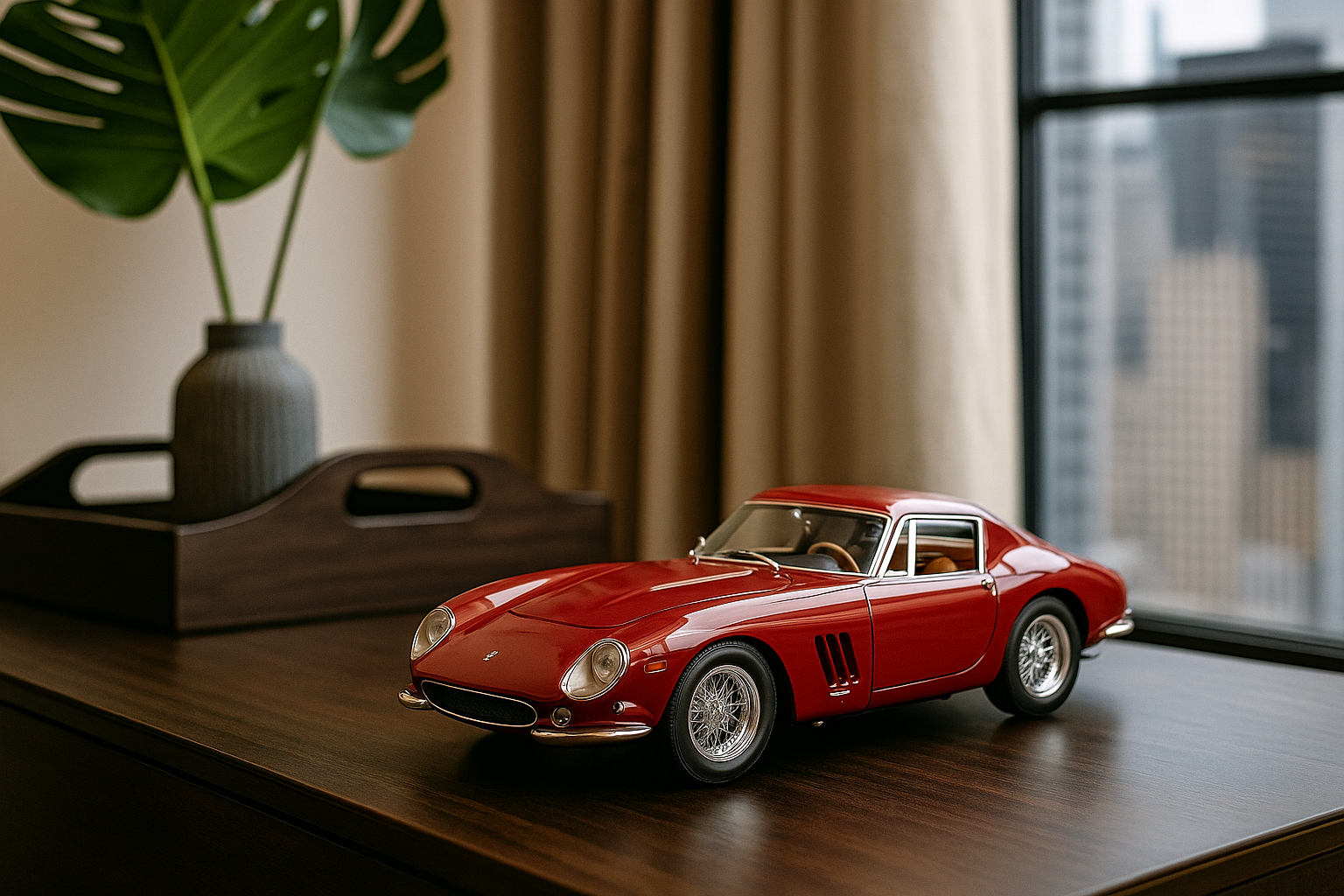
Lancia D50 Rolling Chassis 1955 incl. base plate CMC M-198 LE 1000

Description
Lancia cars have always been known for innovation, especially in motorsport models. The Formula 1 car was no different.
Would you like to explore the inner workings of a CMC model? We can help you with that. We've removed the bodywork. This created a so-called "rolling chassis," which shows you in detail the structure of the richly structured tubular space frame, as well as providing in-depth insights into the layout of the wheel suspension and drivetrain, including the engine and the transmission (tranaxle) mounted on the rear axle.
You can now study the engine in detail. It is integrated into the frame structure as a load-bearing element. Its installation position, offset 12° to the left around its longitudinal axis, with its dual magneto ignition system, is interesting to observe. The angled installation of the engine allowed the propshaft, rotating at crankshaft speed, to be routed past the driver's left side to the gearbox mounted transversely on the de Dion rear axle. This drivetrain arrangement allowed for a significantly lowered driver's seat and thus a very low design for the single-seater, with consequent aerodynamic advantages. It is also worth inspecting the oil reservoir located at the rear of the vehicle, which always supplies the engine's dry sump lubrication system with sufficient recooled oil via interposed oil coolers. An elaborate steering wheel worm gear is another highlight on the journey of discovery.
The skeletonized chassis is rounded off by the authentically routed exhaust system with stainless steel pipes and the delicately constructed spoked wheels with hand-drawn and nippled stainless steel wire spokes.
Continue to admire and enjoy the wealth of craftsmanship in this unusual model variant, which will look great in any car model collection.
CMC Legal Disclaimer
The use of racing team and/or driver names, symbols, starting numbers, and/or descriptions is solely for reference purposes. Unless otherwise stated, it does not imply that the CMC scale model is a product of any of these racing teams/drivers or endorsed by any of them.
Model description
•
Technical data of the original vehicle
• Monoposto with free-standing wheels built on a tubular frame
• 8 cylinder 90°V engine as a load-bearing chassis element
• 2 valves per cylinder, controlled by two overhead camshafts
• Dry sump lubrication
• Mixture preparation with four Solex PII flat-flow double carburettors
• Dual ignition (two spark plugs per cylinder)
• Transversely mounted five-speed gearbox behind the driver
| Bore x stroke: | 73.6 x 73.1 mm |
| Engine capacity: | 2,488 cc |
| Perfomance: | 260 hp at 8,000 rpm |
| Top speed: | 300 km/h (depending on rear axle ratio) |
| Wheelbase: | 2,280 mm |
| Front/rear track: | 1,294 / 1,330 mm |
| Total length: | 3. 570 mm |
| Total width: | 1,600 mm |
| Total height: | 1,001 mm |
| Empty weight: | 620 kg |
Notice
Lancia cars have always been known for innovation, especially in motorsport models. The Formula 1 car was no different.
Would you like to explore the inner workings of a CMC model? We can help you with that. We've removed the bodywork. This created a so-called "rolling chassis," which shows you in detail the structure of the richly structured tubular space frame, as well as providing in-depth insights into the layout of the wheel suspension and drivetrain, including the engine and the transmission (tranaxle) mounted on the rear axle.
You can now study the engine in detail. It is integrated into the frame structure as a load-bearing element. Its installation position, offset 12° to the left around its longitudinal axis, with its dual magneto ignition system, is interesting to observe. The angled installation of the engine allowed the propshaft, rotating at crankshaft speed, to be routed past the driver's left side to the gearbox mounted transversely on the de Dion rear axle. This drivetrain arrangement allowed for a significantly lowered driver's seat and thus a very low design for the single-seater, with consequent aerodynamic advantages. It is also worth inspecting the oil reservoir located at the rear of the vehicle, which always supplies the engine's dry sump lubrication system with sufficient recooled oil via interposed oil coolers. An elaborate steering wheel worm gear is another highlight on the journey of discovery.
The skeletonized chassis is rounded off by the authentically routed exhaust system with stainless steel pipes and the delicately constructed spoked wheels with hand-drawn and nippled stainless steel wire spokes.
Continue to admire and enjoy the wealth of craftsmanship in this unusual model variant, which will look great in any car model collection.
CMC Legal Disclaimer
The use of racing team and/or driver names, symbols, starting numbers, and/or descriptions is solely for reference purposes. Unless otherwise stated, it does not imply that the CMC scale model is a product of any of these racing teams/drivers or endorsed by any of them.
Model description
•
Technical data of the original vehicle
• Monoposto with free-standing wheels built on a tubular frame
• 8 cylinder 90°V engine as a load-bearing chassis element
• 2 valves per cylinder, controlled by two overhead camshafts
• Dry sump lubrication
• Mixture preparation with four Solex PII flat-flow double carburettors
• Dual ignition (two spark plugs per cylinder)
• Transversely mounted five-speed gearbox behind the driver
| Bore x stroke: | 73.6 x 73.1 mm |
| Engine capacity: | 2,488 cc |
| Perfomance: | 260 hp at 8,000 rpm |
| Top speed: | 300 km/h (depending on rear axle ratio) |
| Wheelbase: | 2,280 mm |
| Front/rear track: | 1,294 / 1,330 mm |
| Total length: | 3. 570 mm |
| Total width: | 1,600 mm |
| Total height: | 1,001 mm |
| Empty weight: | 620 kg |








